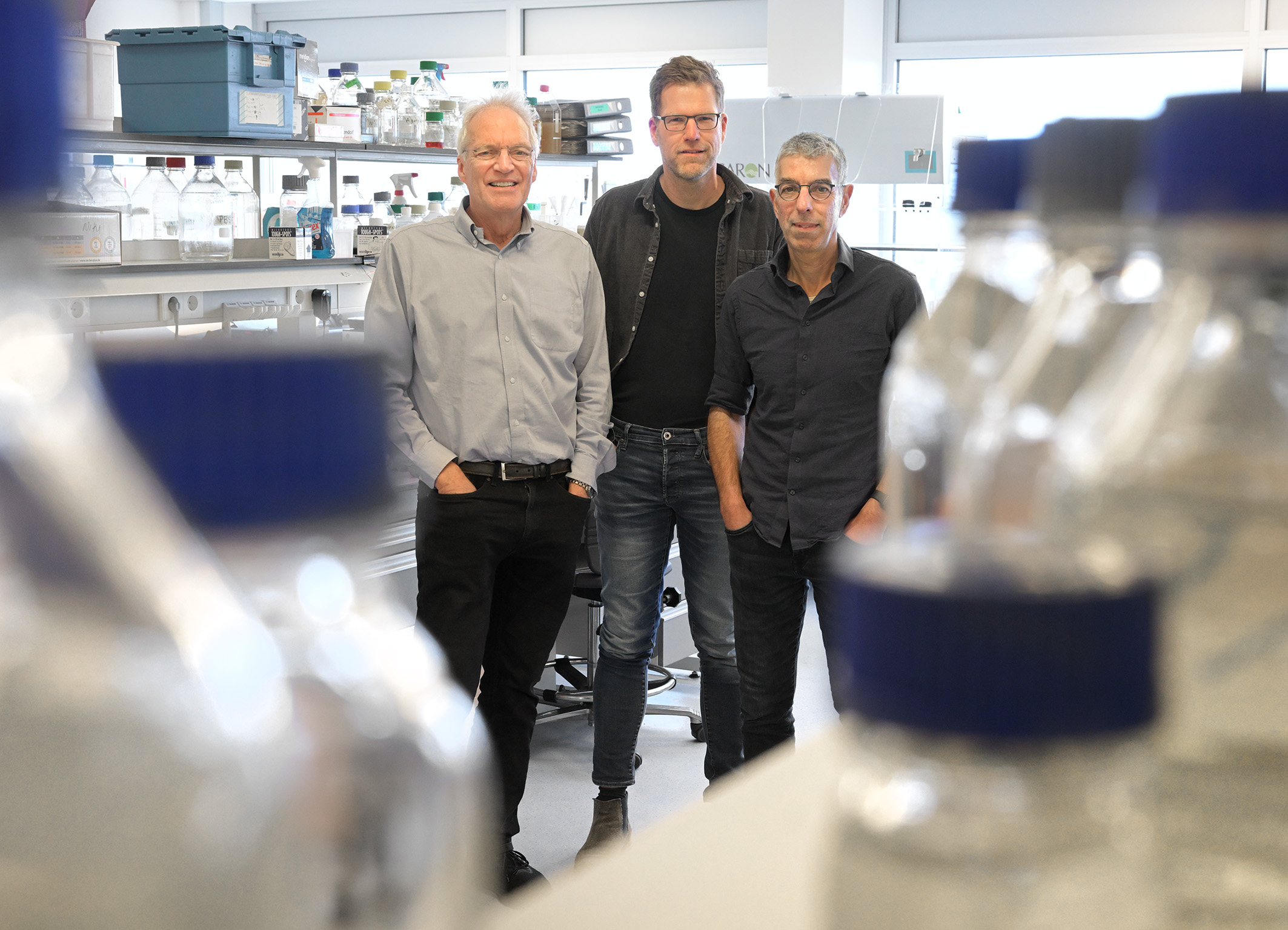Three Oncode Investigators – Rene Bernards, Thijn Brummelkamp and Reuven Agami (all at the Netherlands Cancer Institute) – received the competitive and prestigious ERC Advanced grant. The grant is meant to support cutting-edge research and targets established, leading researchers with a proven track record of significant achievements.

Paradoxical activation of oncogenic signalling as a cancer treatment strategy
Rene Bernards and his team found a counterintuitive approach to combating cancer cells. The development of targeted cancer therapies has enabled the selective inhibition of activated oncogenic signalling pathways, with many new drugs inhibiting the processes cancer cells need to divide rapidly. But over time, the cells become resistant to the effect of the drugs and become unresponsive to treatment. Bernards found a counterintuitive approach - a ‘paradoxical intervention’ - which means that instead of attempting to inhibit oncogenic signalling, his laboratory researched the effect of further activating mitogenic signalling to disrupt the labile homeostasis of cancer cells and overload stress response pathways. Such overactivation can be combined with stress targeted drugs to kill overstressed cancer cells.
“This grant is based on a bold and unorthodox approach to treating cancer. The reason that it became fundable is that we were able to establish proof of concept for this notion through funding by the Oncode Institute” says Bernards.
With the newly received ERC Advanced grant, he will continue breaking trail in his research. Using drugs that further activate oncogenic signaling in cancer cells (protein phosphatase 2A (PP2A) inhibitors, GSK3β inhibitors, PKC activators, DUSP inhibitors), Bernards and his team will study the associated toxicities using multi-omics technologies, and aiming to understand and exploit toxicities associated with paradoxical activation of oncogenic signaling. They will also address the effects of this type of therapy on normal cells and pre-malignant lesions and study how cancer cells can develop tumor-suppressive drug resistance.
Deep Genetics to study and uncover ‘hidden’ biology
Oncode Investigator Thijn Brummelkamp and his team have conducted genetic research in human cells for many years, resulting in the creation of a database housing over 150 screens for molecular phenotypes. These discoveries underscore the notion of "hidden" biology, where novel pathways may be obscured by established mechanisms or remain inactive.
Their work shows that such processes can be uncovered readily using so called genetic modifier screens: screens carried out in the presence of a mutation in another gene. They also have the potential to reveal an entirely new pathway rather than an individual factor, often not studied by others before.
Together with his team, Brummelkamp will search for such biology in a rational and systematic way, conducting experiments to uncover such hidden biology in connection to a dozen important cellular phenotypes. “I am very grateful to the ERC. This grant will allow us to take genetics in human cells to the next level and I hope it will deliver unexpected and exciting new findings in cell biology” he says.
Causes and consequences of aberrant mRNA translation in cancer
Shortages in amino acids are weapons in the warfare between tumor cells and tumor-infiltrating lymphocytes. Tumor cells enhance or inhibit the production of key amino acid metabolites to stimulate oncogenesis and suppress anti-tumor activity. A key player in this battle is tryptophan. Activated T cells secrete interferon-γ, which upregulates IDO1 enzyme to catabolize tryptophan to kynurenine in target tumor cells. While kynurenine suppresses T-cell function, its production limits tryptophan availability in tumor cells.
Importantly, as tumor cells almost invariably deregulate mRNA translation to promote proliferation and metastasis, the consequences of tryptophan shortage are major. It provokes aberrant mRNA translation at tryptophan codons, resulting in ribosomal frameshifting and tryptophan to phenylalanine (W>F) codon reassignments (substitutants). This aberrant mRNA translation alters protein function and enriches the landscape of neoepitopes at the surface of tumor cells.
Based on these observations, Oncode Investigator Reuven Agami and his team hypothesize that the detection of aberrant proteins in cancer specimens can reveal additional key processes of cancer progression beyond tryptophan that can be utilized for cancer therapy. With this grant, they will now be able to explore this exciting new idea.
“This grant builds upon a fundamental phenomenon we uncovered in cancer biology during the past three years” says Agami. “While most cancers accelerate protein production to maintain aggressive growth, in times of nutrition scarcity, proteins are generated with predictable mistakes. We will now chart the landscape of such aberrant proteins, investigate the underlying mechanisms of this phenomenon, and explore ways to use it for better therapy” he adds.
About the ERC Advanced grant
The ERC Advanced Grants target established, leading researchers with a proven trackrecord of significant achievements. The funding is amongst the EU’s most prestigious and competitive, providing leading senior researchers with the opportunity to pursue ambitious, curiosity-driven projects that could lead to major scientific breakthroughs. The new grants, worth in total nearly €652 million, are part of the EU’s Horizon Europe programme.